It’s London Fashion Week, which means I’ve spent the last 5 days with full control over the television. No more Sex and the City, no more Karcrashians. Just me, Netflix and an ocean of possibility.
When I’m home alone, I like to watch documentaries, shit panel shows, and TED. 8 out of 10 Cats isn’t the best fodder for the brain, but the documentary section on Netflix has yet to let me down.
I’ve been inspired by three documentaries in the last week, each in a very different way. Instead of burying their lessons in my viewing history, never to be recalled, I thought I’d share them with you guys.
Each film is around 100 minutes long, and utterly compelling from start to finish. I suggest getting your little grubby paws on them.
Man on Wire
The Fearless Genius
On August 7th 1974, Philippe Petit set off on a quiet stroll from the World Trade Center’s South Tower to the North Tower.
Except it was no ordinary stroll. It was the wire walk that stunned the world.
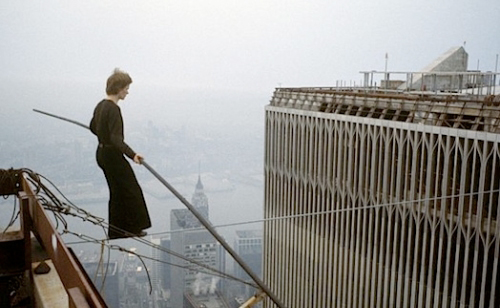
A quarter of a mile above the ground, Petit walked between the ill-fated towers not once, not twice, but eight times.
He enthralled the stunned crowds, somehow finding the grace (and the balls) to lay flat on his back, to kneel to the heavens, and to mock the enraged NYPD who spent over 40 minutes pleading for him to retreat to safety.
At one point Petit offered to surrender. He neared the guards, clearly amused by their dumbfounded horror. A performer to the end, he couldn’t help himself. He turned 180 degrees and raced back in to the abyss, his feet leaving the wire, dancing, showboating. All this a mere 110 stories from instant death below
It took the threat of being ‘captured by helicopter’ to bring an end to Petit’s stunt. He stepped back on to the roof, straight in to police custody, and that was that. New York City continued onwards to work, albeit with a slightly shellshocked stagger.
Philippe Petit had dreamed about the Twin Towers for six years. He planned his stunt long before the towers had been fully constructed. He called it his destiny, and he spent a lifetime training to make it so.
It was the ultimate heist. To break in to the towers, to evade security, to rig his wire in darkness, and then to walk.
The only thing certain was that failure would result in death.
Petit’s life was a combination of gruelling training – both physically and mentally – and undercover sleuthing, of which Solid Snake would be proud.
One does not simply… break in to the World Trade Center, climb to the roof, set up a wire and dance across merrily, balls flapping in the wind.
Such acts require grapefruits of steel a lot of careful planning.
Petit had an unwavering belief that he would one day step across the New York skyline and be immortalised for the feat.
Against all odds, he is remembered today for the culmination of his dream on that [unfortunately] misty morning. And perhaps even more remarkably, he is still alive to tell the tale.
It’s difficult to contemplate what rushes through a man’s mind as he takes his first step off the edge of the South Tower…
Imagine the mental toughness required to place your entire body weight forward, away from safety, on to a three quarter inch wire, while every bone in your body buckles from vertigo as the 1,368 foot drop looms ever closer below.
It can barely be quantified. I shit my pants at the very thought.
But then the average onlooker hasn’t spent a lifetime eating, breathing and sleeping the same reality as Petit. Total conviction drove this man to an achievement that went beyond impressive. It was superhuman.
Petit’s stunt was beamed around the world. There was no publicity, no advance warning, and no precedent. Just 40 minutes of daredevil lunacy that forced an entire city to stop in silence, and to stare at a man in the sky.
His journey is captured brilliantly in the Man on Wire documentary.

Bobby Fischer Against The World
The Calculating Genius
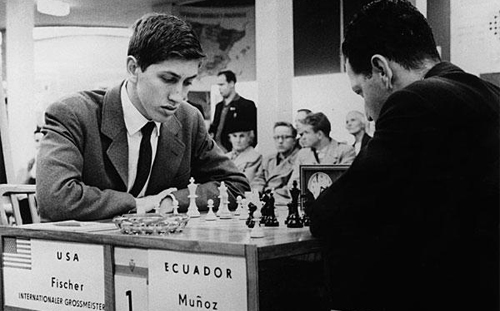
Successful businessmen are distinguishable by their ability to think several steps ahead of the competition. They visualise the game we call life, they gauge their moves – as well as what life intends to throw back at them – and they make a decision based on the likely outcomes.
To be just one step ahead is to be blessed.
Now consider the excellence of a chess grandmaster…
“There are 400 different positions after each player makes one move apiece. There are 72,084 positions after two moves apiece. There are 9+ million positions after three moves apiece. There are 288+ billion different possible positions after four moves apiece. There are more 40-move games on Level-1 than the number of electrons in our universe. There are more game-trees of Chess than the number of galaxies (100+ billion), and more openings, defences, gambits, etc. than the number of quarks in our universe!”
– Chesmayne
A novice chess player can enjoy much success over fellow amateurs by thinking 3 or 4 steps ahead.
A grandmaster will regularly think up to 12 moves ahead.
The best of the best have such astonishing memorisation and visualisation techniques that their brains can filter through billions of potential positions and pick the best possible move while you and I are still processing the last.
What made Bobby Fischer so remarkable was that he could make those calculations barely a decade after leaving the womb.
His excellence was the result of endless hours analysing positions and outcomes in excruciating detail. He was a child prodigy in every sense.
Aged just 14, Fischer became the youngest ever US Champion. A year later, he was the youngest grandmaster in chess history. He would travel the country holding exhibitions where he would compete against 30-40 amateurs at the same time, soundly beating them all, swaggering from one table to the next.
Fischer’s life revolved around the chessboard to such an extent that his mother forced him to see a psychiatrist to try and kick the addiction. It was all he ever talked about, all he ever cared about.
The problem for Fischer, as many calculating geniuses have discovered, was that he never knew how to switch his brain off. He wouldn’t just think 12 steps ahead on the chessboard. He’d think 12 minutes ahead at the supermarket. He’d analyse each and every part of his life in such cynical detail that, inevitably, his world came crashing down. The paranoia turned Fischer in to a recluse.
In 1972, Fischer took part in the ‘Match of the Century’ against World Champion Boris Spassky of the USSR. It was the game that put chess on the map. A battle of East vs. West during the height of the Cold War. The tormented, troubled Fischer vs. the latest in a long line of Russian champions.
In the days leading up to the showdown, Fischer was suffering from such inner turmoil that there was doubt he would even show up. After several delays, he eventually got on the plane, and promptly made one of the most spectacular blunders of his career. He lost Game 1, then no-showed Game 2.
Facing a 2-0 deficit and written off by almost everybody, Fischer surged back in to the match and eventually beat Spassky 121/2 – 81/2. He returned to the United States a celebrated hero; an A-list celebrity; the 29-year-old World Chess Champion.
It was the last competitive match he ever played.
Bobby Fischer refused to defend his title in 1975. He disappeared in to obscurity, fled the USA, and eventually became known for an anti-Semitic political agenda that would see him die in lonely exile.
Fischer had a brilliant mind capable of superhuman calculation, but he was just as capable of self-destructing at any given moment. It is a sad and familiar correlation of genius.

Indie Game: The Movie
The Artistic Genius
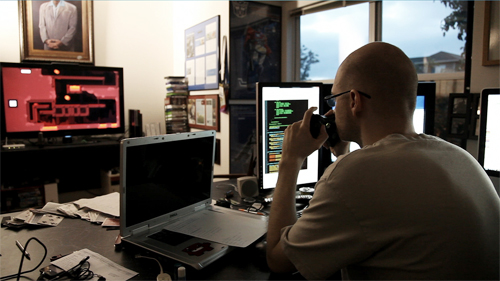
Indie Game follows the exhausting efforts of four independent games developers as they battle through deadlines, Internet trolling, and Microsoft’s lame support to catch a lucky break.
Now, I don’t know much about designing games (even though I once dreamed of it as a career), but thankfully the film doesn’t require any inside knowledge. You need not give a damn about XBox Live or Mario-style platformers. You need only recognise the trials and tribulations of working in isolation, wondering when it might someday pay off.
Someday, someday. That is the hook.
The film covers the development of Super Meat Boy (Edmund McMillen and Tommy Refenes), Fez (Phil Fish) and Braid (Jonathan Blow) with over 300 hours of archived footage.
The smell of blood, sweat and tears emanating from their bedroom slash home-offices is palpable throughout. This is a documentary made for affiliate marketers.
Indie Game covers many hotbed talking points, including artistic integrity vs. monetary return. Most interestingly, it touches on the process of launching a product and watching the online world react.
If you’ve undergone this cathartic rites of passage, you’ll be able to relate to the uncontrollable nervous energy. The not knowing what to expect. The sheer blindness of working on something so hard and for so long that you can no longer tell whether it’s a work of art or a glistening turd.
One developer states matter-of-factly that if he doesn’t launch his game, he’ll have no choice but to kill himself. It’s an extreme threat, but clearly non-negotiable.
Another developer suffers a launch day bitch slap from Microsoft where it’s a wonder that he hasn’t yet been arrested for hunting down Bill Gates and burning him at the stake.
The film is slow out of the blocks, but it’s impossible not to be fully invested by the final third. The payoff is immense, a proverbial kick up the arse if ever you needed one.
Anybody who works online can relate to that passing moment of accomplishment between achieving one goal and drowning in the next. Indie Game: The Movie is like a surge of adrenaline for those on the brink of achieving something awesome.
Watch this shit and your motivation will soar. That’s the best compliment I can give it.

Suggestions for Inspiring Documentaries
What films have inspired you to go out and achieve big?
Your suggestions are welcome, especially if I can find them on Netflix.
Boom!
Recommended This Week:
I want to say a special ‘thank you’ to everybody who’s picked up a copy of my brand new Affiliate Marketing Survival Guide 2013. The book shot straight to #1 on Amazon’s Marketing bestsellers in the space of 12 hours. Booya! If you haven’t yet grabbed the book, a) Why are we still friends? b) Get one here. It’s $5.


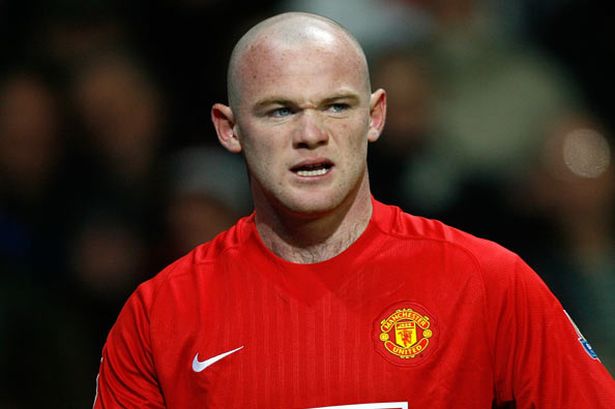
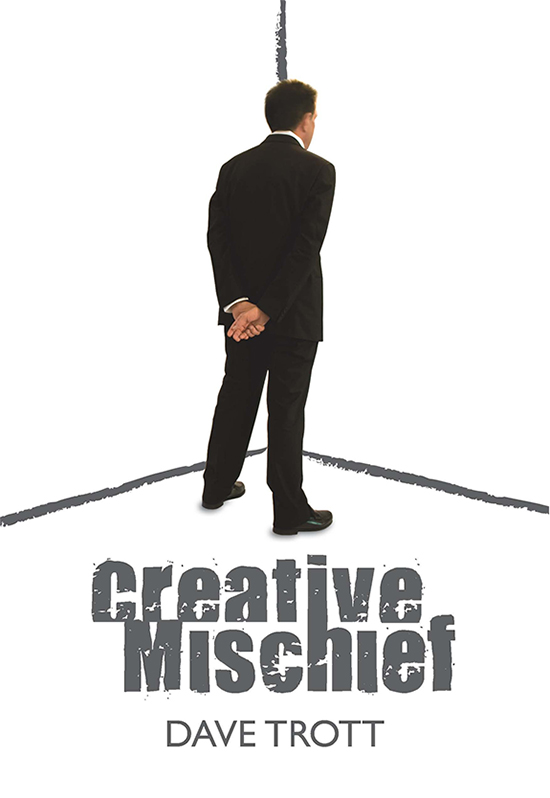






...and breath.